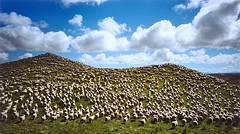 A recent Zogby poll has shown that most Americans are deeply concerned about global warming and want to take action. By now it is well established science that we can delay and possibly prevent the serious effects of global warming by simply decreasing our carbon footprint. One of the best ways to do this is by improving one’s home energy efficiency. Unfortunately, others still doubt the certainty and even the science of global warming. This doubt and indifference can pose a serious threat to the success of an energy efficiency program in a community since it typically results in only a small percentage of the community adopting these changes. Even after the energy crisis of 30 years ago, the spike in oil prices more recently, and the majority of people’s best intentions, the movement towards a more energy efficient society has languished.
A recent Zogby poll has shown that most Americans are deeply concerned about global warming and want to take action. By now it is well established science that we can delay and possibly prevent the serious effects of global warming by simply decreasing our carbon footprint. One of the best ways to do this is by improving one’s home energy efficiency. Unfortunately, others still doubt the certainty and even the science of global warming. This doubt and indifference can pose a serious threat to the success of an energy efficiency program in a community since it typically results in only a small percentage of the community adopting these changes. Even after the energy crisis of 30 years ago, the spike in oil prices more recently, and the majority of people’s best intentions, the movement towards a more energy efficient society has languished.
The global warming skeptic continues to consume and waste energy without worrying about the consequences because in their mind there are no consequences. But their bad behavior can often defeat the conviction of those who want to do something about climate change. Consider a newly health-conscious individual living in a house full of smokers, why should they give up smoking? In the end, the individual will probably decide not to give it up since the effort won’t dramatically affect their smoke filled environment or their own health.
Similarly, if our neighbors have drafty homes and choose to crank up the air conditioning in the summer then why should we improve the insulation in our homes? Our efforts will seem be canceled by their bad behavior. This is a well established social-economic phenomenon known by such terms as the prisoner’s dilemma, the tragedy of the commons (with Smurfs!), and diffusion of responsibility.
In the past, some people have recognized the destruction of the commons and were able to take systemic action to correct it. Societies have long placed limits on the number of fish & game one is allowed to take; with vary degrees of accuracy and success. Cholera outbreaks occurred often in large cities before centralized sanitation and sewage disposal were seen as the solution and implemented. These societal modifications were incremental and took time to evolve and spread, luxury we can ill afford.
The first step must be individual effort for personal and societal benefit. Being an adopter of home energy efficiency today is taking a stand against apathy and perceived helplessness. Implementing energy efficiency measures one by one, our efforts will add up. Hopefully, as a greater number strive to decrease their carbon footprint, a grassroots political force will form which will be able to affect institutional and policy changes to mandate minimum efficiency standards for everyone. This will have the intended consequence of decreasing our society’s energy use without having to depend on individual acts of goodwill to sustain it. In the end, our global commons will benefit by both individual and community action.

Here’s a recent article from New Scientist about this: http://www.newscientist.com/article/mg20327225.700